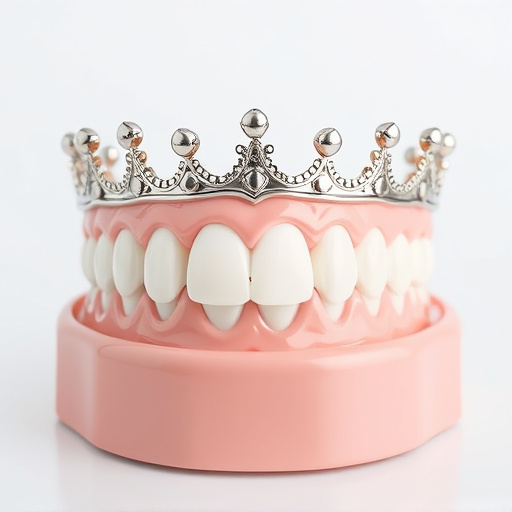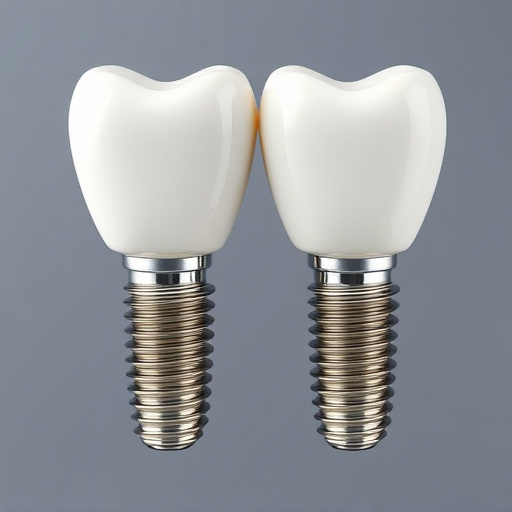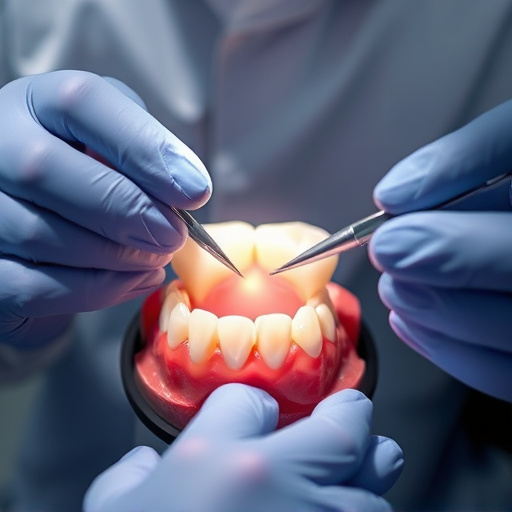Implant supported dentures (ISDs) offer a modern dental solution for missing teeth, providing improved stability, comfort, and long-term gum health compared to traditional dentures. The process involves a consultation, surgical placement of titanium screws integrating with the jawbone through osseointegration, routine exams, and aftercare. ISDs mimic natural teeth, preserve bone density, and eliminate movement/pressure that causes irritation. Regular dental cleanings are crucial for optimal ISD treatment.
“Discover the revolutionary solution for tooth loss with implant supported dentures—a safe, effective, and comfortable alternative to traditional options. This comprehensive guide explores the basics of implants, highlighting their distinct advantages over conventional dentures. We delve into how these advanced fixtures minimize gum irritation and accelerate healing processes, ensuring a healthier, more natural mouth feel. By understanding the benefits of implant supported dentures, you can make an informed decision towards restoring your smile.”
- Understanding Implant Supported Dentures: A Basic Guide
- Advantages of Implants Over Traditional Dentures
- How Implants Reduce Gum Irritation and Promote Healing
Understanding Implant Supported Dentures: A Basic Guide

Implant supported dentures are a modern dental solution designed to replace missing teeth and restore oral function. Unlike traditional dentures that rest on the gums, implant-supported dentures are secured directly to the jawbone using surgical implants. This innovative approach offers several advantages, including improved stability, comfort, and long-term durability. The process begins with a consultation where a dentist assesses your oral health, discusses your goals, and determines if you’re a suitable candidate for implants.
During the procedure, tiny titanium screws are placed surgically into the jawbone to act as artificial tooth roots. Over time, these implants integrate with the bone through osseointegration, creating a solid foundation for the dentures. This fusion provides exceptional support, allowing patients to enjoy their new teeth without slips or discomfort often associated with traditional dentures. Following the placement, routine oral exams and proper aftercare are crucial to ensure the longevity of these advanced dental prosthetics, which can mimic both function and aesthetics of natural teeth, including the option for cosmetic fillings or dental crowns as needed.
Advantages of Implants Over Traditional Dentures

Implant supported dentures offer several advantages over traditional dentures, making them a preferred choice for many dental patients. One of the key benefits is their ability to reduce gum irritation. Unlike conventional dentures that rest on the gums, implants are surgically placed in the jawbone, providing a more secure and stable fit. This eliminates the friction and pressure that can cause discomfort and inflammation in the soft tissues of the mouth.
Furthermore, implants support a more natural chewing experience, as they mimic the root structure of teeth. This is especially important for patients who have suffered tooth extractions and need to restore their chewing function. Unlike clear aligners or devices used in children’s dentistry, implant supported dentures are long-term solutions that can last for decades with proper care. They also preserve bone density, which is a significant concern after tooth extractions, ensuring facial structure and appearance remain intact over time.
How Implants Reduce Gum Irritation and Promote Healing

Implant supported dentures (ISDs) offer a significant advantage over traditional removable dentures when it comes to gum health. Unlike removable options that can cause irritation and inflammation due to constant adjustments and poor fit, implants are surgically placed in the jawbone, providing a stable and secure base for the replacement teeth. This direct attachment to the bone prevents the movement and pressure that can irritate gums, leading to discomfort and potential tissue damage.
Furthermore, ISDs promote healing by stimulating the jawbone through osseointegration, a process where the implant fuses with the bone. This fusion not only ensures a solid foundation but also encourages bone regeneration in areas where teeth are missing, which is crucial for maintaining facial structure and overall oral health. Regular dental cleanings and check-ups, often facilitated by family dentistry practices, play a vital role in managing implants and supporting ongoing gum healing, ensuring optimal oral health long-term.
Implant supported dentures represent a significant advancement in dental care, offering not only a more comfortable and natural solution for tooth replacement but also promoting healthier gums. By understanding the benefits of implants over traditional dentures and their ability to reduce gum irritation, individuals seeking long-term oral health solutions can make informed decisions. This innovative approach to dentistry ensures improved quality of life and a durable, functional smile.














